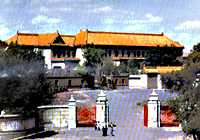 The palace where China's last emperor lived for over 10 years is being restored in Changchun, capital of northeast China's Jilin Province.
The palace where China's last emperor lived for over 10 years is being restored in Changchun, capital of northeast China's Jilin Province.
Aisin Gioro Puyi was made emperor of "Manchukuo" -- a puppet regime propped up by Japanese invaders from 1934 to 1945 -- after he was driven out of Beijing's Forbidden City in 1924.
Changchun has invested some 645 million yuan (US$7.8 million) to maintain and overhaul the palace, according a senior official surnamed Zhao from the palace museum.
Wang Zuxin, manager of the Jilin Wanda Decoration Co in charge of the two main repair projects, said: "It is not easy to repair and restore the palace, which has been seriously damaged in the past half-century."
While Beijing's Forbidden City has always been carefully protected, the Changchun palace was deserted after 1945.
After Puyi left, it was first used by gangsters and then as a warehouse, primary school and factory workshop. It was not under official protection until the 1980s.
"We can only depend on old photos, magazines and our imagination to restore the interior decoration because now there is nothing left inside the houses, not even the wallpaper, " said Wang.
Another problem faced by the restorers is that the palace mixed various architectural styles.
Wang Lijie, a senior researcher at the Changchun palace museum, said: "These historical structures are a mixture of Chinese, Japanese and Russian architectural styles, with some of them designed by prestigious architects of the time."
Manager Wang Zuxin said: "We changed our designs four times to come up with an appropriate and reasonable doorknob.
It was really excruciating but has turned into our pride and joy."
Most of the main construction work has been finished and most of the site is open to visitors now.
The palace is located in northeast Changchun, covering an area of 12 hectares.
(China Daily June 16, 2003)
|

